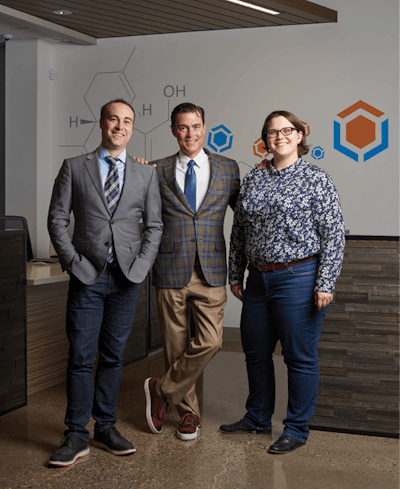
Survey a group of medical marijuana cultivators on why they grow cannabis and most are likely to answer that they want to help people: sick children, ailing veterans and people from all walks of life afflicted with devastating or chronic medical conditions.
Dr. Andrew Bachman, M.D., co-founder and CEO of LeafLine Labs, a Minnesota-based medical marijuana producer and patient care center operator, is no different. After spending 11 years as an emergency care doctor in his home-state of Minnesota and seeing the effects of the opioid crisis first-hand, he decided something needed to be done. (Minnesota saw more than 500 people die from opioid abuse in 2014 and nearly 600 in 2015, according to data from the Center for Disease Control.)
“When you know better, do better,” Bachman often repeats, quoting Maya Angelou. His company, co-founded with fellow physician Dr. Gary Starr, is built upon that code: Patients are placed above profits.
The company never promised investors a quick payout, yet managed to raise nearly $16 million—before officially starting to offer its products in July 2015—by selling those investors on that philosophy.
That money went toward building a 42,000-square foot, pharmaceutical-grade medical cannabis cultivation and processing facility (Minnesota’s program only allows for cannabis extracts), as well as four patient care centers.
Driven by Passion
For Bachman, launching LeafLine Labs was a bit like going back to his roots. His family has owned and operated an ornamental greenhouse business since his great-grandfather turned an inherited parcel of land into what would become a long-standing family business nearly a century ago.
“I have grown up with that as my proud history,” Bachman says, adding that this history meshes perfectly with his passion and knowledge of medicine.
“Those two worlds just complement each other beautifully well here in the cannabis space, and when you look in the mirror and realize that you will do this best for a state I love dearly and the people who live here, then in my opinion, you don't have a choice. You just simply act.”
I think of it as we're bringing medicine back to Main Street. – Colin Kelley, COO and CFO, LeafLine Labs
And Bachman needed to act fast. When Gov. Mark Dayton signed Minnesota’s medical cannabis bill into law on May 29, 2014, applicants had only until Oct. 3 to send in their applications. LeafLine Labs and Minnesota Medical Solutions were awarded one cultivation and four dispensary licenses each on Dec. 1, and both groups were mandated to get product on shelves by July 1, 2015.
“We had … six months to get a care center location located and built out,” Bachman says. The group first purchased 17 acres of land in Cottage Grove, Minn. (about 20 minutes from the heart of St. Paul, Minn.) Then, construction of a completely controlled grow facility began.
The 42,000-square-foot facility is “completely indoors and dedicated to growing not just plants, but to growing this plant in a pharmaceutical-grade manner exceptionally well,” Bachman says. The facility is built in a way that the group can easily expand in two different phases: first to 100,000 square feet, then to 162,000 square feet, as needed. Bachman, however, does not believe that will be necessary for now.
“The efficiencies that we have put in place and yields that those have returned have been so amazing that I do not anticipate needing to do anything to a facility that is operating beautifully for the foreseeable future,” he says.
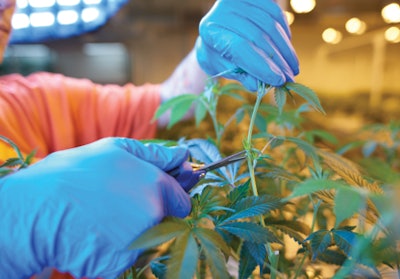
The CEO knows the process and his company’s expansion was quick. A year ago, LeafLine employed 11 people. Today, he says, the company has 70 employees in five locations around Minnesota.
“The team has passionately grown, and we are blessed to have each and every one of them,” Bachman says. “It's an industry that draws very passionate individuals.”
Mission-Aligned Investors
Not only does LeafLine Labs have passionate employees, Bachman says it also has passionate investors that believe in the group’s mission.
“It is one of the strengths of our company and our organization, the mission-aligned support of our friends and family and investor base. This isn't massively venture-capital funded or anything along those lines,” he explains.
Instead, the LeafLine team targeted individuals that had a vested interest in the business: friends, family and “most importantly,” Bachman says, “a sizable number of physician and professional caregiver colleagues who … similarly are frustrated with the system the way it is, [and] identified that we need to be doing better.”
He says getting the right investors at the right time, and not being desperate, are what allowed LeafLine to get one of the largest capital raises in the cannabis industry. LeafLine stuck with its core mission: patients over profits. But even Bachman was surprised by the fruits of his labor.
“At the time, I didn't realize that was unique,” he says. “That just is right from our perspective. We just did it the right way—not because we are needing to set the standard, but because we wouldn't care for anybody in any other way.”
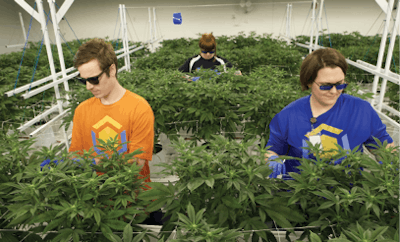
The Science and Art of Growing Plants
While Bachman is the visionary at LeafLine Labs (as well as one of its many medical experts), the day-to-day cultivation operations fall on his director of cultivation, Emily Kowalski.
As a female director of cultivation, Kowalski is a unicorn in the cannabis industry. “[That’s] a reality, but I just hope it doesn't discourage women from coming into this space,” Kowalski says. “Because it's a great space to be in. I would greatly encourage women to have the drive to become head cultivators, if that's what they want to do.”
Being from the very male-dominated horticulture and greenhouse industry, however, it is a role to which she is already accustomed, she says.
“I see it more as an opportunity,” Kowalski says. “For instance, at LeafLine, there are a lot of women in leadership roles. So in my day-to-day, it doesn't feel like I'm outnumbered by any means, but I see it as an opportunity to bring my skills and my perspectives to this growing industry.”
Skills and perspective are things she has in abundance, between a Bachelor of Science degree in horticulture from the University of Wisconsin–Madison and several years of experience working in commercial greenhouses. To top it off, horticulture has been a part of her life since she was a child: Summer mornings were often spent tending her family garden with her mother, and visits to the Boerner Botanical Gardens in her hometown of Milwaukee, Wisc., always enamored the young Kowalski.
Interestingly, horticulture was not her initial interest when she first got to college: Pharmacology was Kowalski's first choice.
“I was actually intending to become a pharmacist, but horticulture was always in the back of my mind as something—as an interesting career and a very fun, diverse career too. There are many different paths you can take within horticulture, and so the first horticulture class I took was a plant propagation class, and I just became hooked on horticulture,” she explains.
At LeafLine Labs, she has come full-circle, combining best practices and processes from the pharmaceutical space with her greenhouse and outdoor nursery experience as she helms a large-scale medical cannabis operation.
The first step to building any cultivation operation is determining your main objective, according to Kowalski: Are you growing for maximum yield? Highest potency? Specific cannabinoid profiles?
For LeafLine, that objective was clear from the start: consistent, high-quality medical cannabis.
“The biggest part of the reason I'm here is because I really take pride in being able to use my skills as a horticulturalist and a cultivator to provide medication to patients,” Kowalski says about her joining the company in June 2015. “I was thrilled to join a company with a clear mission to provide consistent, high-quality cannabis medication as well as personal care to the patients of Minnesota.”
Minnesota being an extract-only market, Kowalski oversees every detail of the cultivation until the extraction and processing phases. Four grow rooms (one for propagation and three for flowering) take up most of the 42,000-square-foot enclosed indoor facility. There are no greenhouse-style roof sections or even windows in the entire cultivation area.
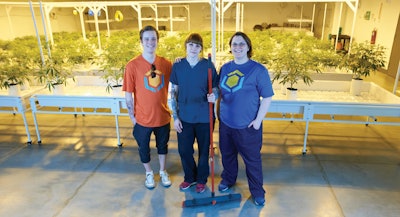
“It was designed that way for consistency and reproducibility,” Kowalski explains.
Controlling as many of those variables (such as lighting) is crucial when looking for consistency, she says. Irrigation, airflow, the double-ended HPS lights, humidity and temperature are fine-tuned through an automated environmental control system to ensure plant health, which is also a big part of the company’s integrated pest management (IPM) protocols.
“Healthy plants are less susceptible to disease and insect damage, and we get that in a couple different ways. One is by controlling the environmental variables,” Kowalski says. “The second ... that's really important is the cleanliness of the facility.”
According to Kowalski, leaving soil or perlite on the ground beneath grow tables, for example, is a disaster waiting to happen.
“I can't tell you how many greenhouses you go into and there are just weeds upon weeds underneath the grow benches because there's a pile of peat and perlite just sitting on the ground,” she says. “Well, that's going to harbor insects.”
On top of keeping the rooms as immaculate as possible, Kowalski and her staff of growers change into work scrubs before entering the growing area, door sweeps keep anything from crawling into the rooms, and tools and work surfaces are sanitized after every use. All these precautions are taken to avoid having to use chemical pesticides, she says.
When pest problems do come up, Kowalski treats the issue with natural products such as garlic oil and peppermint oil that she says work very well, if you catch the problems early.
“Before [treating the problem] is scouting: scouting for insects and diseases, really being present and looking at your plants, looking at their changes, … monitoring sticky cards for insect tissues, things like that,” she says.
Catching issues early and treating them with natural, plant-based products is an important part of LeafLine Labs’ patient-focus. “If you just spray … you're putting your patients at risk,” Kowalski says.
Controlling the environment through automated systems has another benefit: Kowalski and her team can spend more time monitoring the plants’ health and needs rather than on menial tasks. For example, the automated drip-feed irrigation gives consistent water supplies to every plant. The extra time allows the growing team to check every plant individually, supplementing with hand-watering as needed.
“Horticulture is the science and art of cultivating plants,” she says. “You can't just walk away. This isn't a no-maintenance kind of a situation. You have to be in the plants. … Even though we have automation, you still have to have people, and really skilled, intelligent, passionate people.”
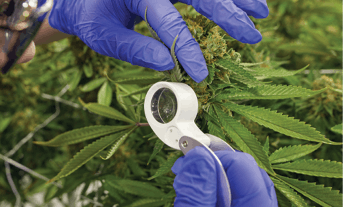
Bringing Medicine Back to Main Street
For Colin Kelley, CFO and COO at LeafLine Labs, this company is somewhat of a family affair: Bachman is related to Kelley’s cousin, and the two often attend the same Christmas and Thanksgiving parties. That was a big part of what made Kelley so comfortable in joining LeafLine Labs in 2015.
But Kelley’s comfort with LeafLine Labs goes beyond his kinship with its co-founder: a business degree mixed with investment, startup and health care experience made him a great fit within the company.
“I love being in a smaller organization and being able to effect change really quickly, and have a big impact on the company and the customers as well,” Kelley says.
In his dual roles, Kelley oversees most of the processes and the company’s financials (another part he enjoys about start-ups: Everyone does a little bit of everything). LeafLine Labs’ standard operating procedures (SOPs) were created with the company’s mantra in mind, but also around the state’s extract-only rules.
“[Emily’s] responsibility was to grow clean plants that don't have heavy metals, pesticides, mold, biological contaminants, things like that—but to grow them also [consistently]. And not just in consistent yields, but in consistent cannabinoid profiles, terpene profiles, things of that nature,” Kelley explains, adding that the same consistency- and safety-focused approach is applied to its team of laboratory scientists.
Every process is examined to determine what is best for the patient: Is this the best way to grow this product? Is this the cheapest way, or the best way? What’s the best delivery method? Tincture or spray? Capsule or topical? Oil or vaporizing?
This process allowed LeafLine Labs to develop a vaporizer cartridge that is 100-percent cannabis product: No cutting agent such as ethylene glycol or medium-chain triglycerides (MCT) such as coconut oil.
According to Kelley, when polyethylene glycol is vaporized, its chemical structure resembles that of formaldehyde, a widely used component of embalming fluid. MCT, he adds, can burn a patient’s lips or throat.
“We didn't want that for our patients,” he says. “We didn't want the cure to be worse than the condition.”
A constant flow of information is passed between patient care center operators and the lab team in charge of making the products and developing the delivery methods to ensure patients are getting what they need, how they need it.
“We're taking health care … and bringing it back to the patient, where the patient and their caretakers are ... making decisions again,” Kelley says. "I think of it as we're bringing medicine back to Main Street."
Overseeing all the company’s operations makes it easier for him to allocate funds where needed. But surprise expenses don’t pop up too often, he says. That’s because when the company set out to raise capital, they had a clear budget in mind.
“We didn't look at it from the perspective so many people [have] when they start a business, … [saying], ‘Look, here's my business plan,’ or ‘Here's my idea, and I think I can do this,’” Kelley explains. “We flipped that on its head, and from the very, very, very beginning, we looked at this from that patient perspective and said, ‘What do we need to do and what do we need to have in place in order to … grow the best plants, make the best medicine and deliver the best care to patients?’”
“We knew we needed a certain amount of startup costs, and we knew we needed to operate for a period of time as well, and so that's what we did. We raised that money,” he says.
Making a conservative budget is what allows LeafLine Labs to help patients and survive in what is a tough market: Minnesota registry data shows that just under 5,000 patients are registered for the state’s medical marijuana program, greatly limiting the two producers’ earning potential. The state’s two cultivation companies lost a combined $5.2 million in 2015, according to an Associated Press audit of the company’s records.
Most investors despise such situations. But by acquiring investors that act more like silent partners who have bought into the business’s philosophy, Kelley doesn’t have to worry about angry calls or emails when LeafLine Labs doesn’t make a quick return on investment. Kelley advises other cultivators to be upfront about their projections to attract the right kind of investor.
“Don't promise anything which you can't deliver,” he says.
As much as the concept of running a company without having to worry about making a profit is enticing, the team knows it is not a sustainable model. But Kelley is hopeful about the development of Minnesota’s market. When intractable pain was added to the list of qualifying conditions last August, monthly patient visits resulting in purchases more than doubled (1,009 in July 2016 vs. 2,117 in August 2016).
“We're seeing patient growth be very steady, very consistent month over month. And the revenues are then consistently growing as well,” Kelley says. “We're not yet cash-flow positive. We do anticipate cash-flow positive status within the next 12 to 24 months.”
More Work Ahead
Bachman knows more work lies ahead in various areas: sales, advocacy, lobbying, education, etc. But the brunt of his efforts remains where they have been for the last 14 years: on the patients.
“We're committed to patients and consistently reproducible medicine, and the opportunity to put in place a care model that people in other states and programs are already emulating,” he says.
Although he’s the first to say that he wishes that all the changes and advancements in the industry happened “yesterday”—he calls it a by-product of being an emergency care doctor—the slow and steady progress this industry makes offers an opportunity to take a step back and see the bigger war being fought.
“It is important to, as we move forward, move away from compartmentalizing the plant, and giving the plant evil thoughts and intentions. … Having this industry [is] a great opportunity, I think, to just rethink … herbal medicine, nutraceutical therapies, and health and wellness in general.”
The team has passionately grown, and we are blessed to have each and every one of them. – Andrew Bachman Co-Founder, CEO, LeafLine Labs
















